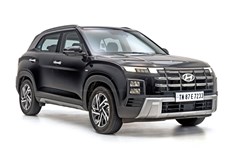2010 Hyundai i10 Kappa2
With the brilliant Kappa2 engine under the hood, the already superb i10 takes a big step forward and drives itself clean out of the reach of any of its nearest rivals
Published on Feb 02, 2011 08:00:00 AM
39,138 Views
Follow us on



The key difference here is the variable valve timing which has given the 1.2-litre Kappa bigger lungs. The upgraded engine produces the same 79bhp at 6000rpm and 11.4kgm at 4000rpm, which means it should feel the same, but a short stint behind the wheel will force a rethink.
The VTVT system means the Kappa2 feels like it makes more power lower in the powerband than the previous Kappa and this is instantly apparent. It feels like a much larger capacity engine, almost like a 1.6-litre motor.
The i10 now jumps off the blocks with just an inch of throttle travel and the Kappa2 revs happily till its 6700rpm redline. This phenomenal acceleration carries on unabated and incredibly, the i10 is quicker to 100kph than the Skoda Fabia 1.6! This makes the Kappa2 a sheer delight to drive not only in the city but also on the highway. It’s a whole lot more refined than the old Kappa motor as well. Where the Kappa motor would feel strained past 4500rpm, version 2 feels noticeably smoother. That said, it doesn’t pull as cleanly to the top as, say, the Swift’s 1.2 K-series motor.
The Kappa2 obliterates the 0-100kph set by the Kappa motor, reaching the mark almost a second quicker — a good indicator of how fast this car really is.
The Kappa2 easily keeps up with highway traffic and doesn’t feel as if it is running out of breath. Nevertheless, if you want more pace to overtake, all that is needed is a quick step down on the light-action, snappy gearbox.
In-gear acceleration is hugely improved as well, with the new i10 taking 14.09sec for 20-80kph and 23.22sec for 40-100kph, the tweaked gear ratios and the engine’s new-found responsiveness helping here.
The real good news is this extra performance hasn’t affected fuel efficiency. We got an identical 11.7kpl and 16kpl for the city and highway cycles respectively. These figures are very impressive considering the amount of power on tap.
Copyright (c) Autocar India. All rights reserved.

















.jpg&w=234&h=156&q=90&c=1)



Comments
Member Login
Personal Details
No comments yet. Be the first to comment.